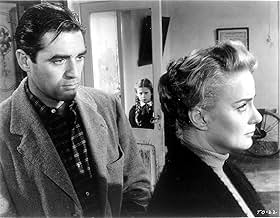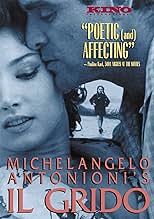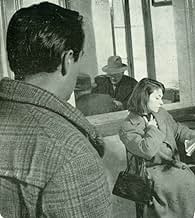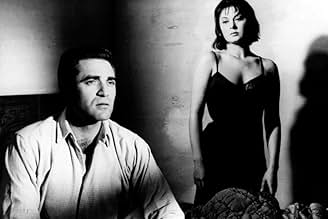IMDb RATING
7.6/10
5.8K
YOUR RATING
A man wanders aimlessly away from his town, away from the woman he loves, emotionally and socially inactive.A man wanders aimlessly away from his town, away from the woman he loves, emotionally and socially inactive.A man wanders aimlessly away from his town, away from the woman he loves, emotionally and socially inactive.
- Awards
- 3 wins & 2 nominations total
Gabriella Pallotta
- Edera, her sister
- (as Gabriella Pallotti)
Jacqueline Jones
- Andreina
- (as Lyn Shaw)
Pietro Corvelatti
- Fisherman
- (uncredited)
Elli Parvo
- Donna Matilda
- (uncredited)
Featured reviews
Other reviews to the contrary, if you found Le Notte or L'Eclisse lacked sufficient plot, I doubt you'll enjoy Il Grido. However, unlike later Antonioni, the focus here is not on fear of commitment & loss of passion, but on a classic spurned lover. Like L'Eclisse, Il Grido begins with breakup, magnificently acted & powerfully filmed; we feel each shudder of pain. In fact, both films' power rests on us sharing this experience, second by second, nerve-end by nerve-end. Note Irma's efforts to hold to the fabric of order & routine to keep a lid on Aldo's fury & the careful portrayal of Aldo's frustrations.
Il Grido's opening builds to a very public & final breakup. It initiates Aldo's journey away from Irma & home. I kept thinking of Schubert's song cycle, Winterreise. In both, after rejection the protagonist's world ceases to hold together. Only here the descent isn't into winter but into fog, industrial sprawl, & ever more spartan existence. Even the piano which accompanies Aldo reminded me of lieder.
The opening's not quite picturesque scenery may suggest nurturing home values. Unlike couples in other Antonioni classics, Aldo & Irma have a daughter, & to Aldo their lives seemed fulfilled. The almost picturesque is soon replaced by encroaching industrial sounds & images. Several times we see trees felled as an old order is being swept away. At film's end, the whole town is slated for demolition, & we are asked to contemplate the relation between the Winterreise-like main text of lost love & this subtext of industrial sprawl & oppressive, intrusive government. No clear connection is given, but as in later Antonioni, the images work their effect as much on our subconscious as on our intellect; whether we can verbalize our thoughts or not, we feel this rupture with earlier values & social structures. For me, Il Grido is a more honest film than L'Avventura. If it lacks a bit of the elegant, refined photo compositions of Antonioni's trilogy, it rests on the same detailed, carefully structured cinematography.
Il Grido's opening builds to a very public & final breakup. It initiates Aldo's journey away from Irma & home. I kept thinking of Schubert's song cycle, Winterreise. In both, after rejection the protagonist's world ceases to hold together. Only here the descent isn't into winter but into fog, industrial sprawl, & ever more spartan existence. Even the piano which accompanies Aldo reminded me of lieder.
The opening's not quite picturesque scenery may suggest nurturing home values. Unlike couples in other Antonioni classics, Aldo & Irma have a daughter, & to Aldo their lives seemed fulfilled. The almost picturesque is soon replaced by encroaching industrial sounds & images. Several times we see trees felled as an old order is being swept away. At film's end, the whole town is slated for demolition, & we are asked to contemplate the relation between the Winterreise-like main text of lost love & this subtext of industrial sprawl & oppressive, intrusive government. No clear connection is given, but as in later Antonioni, the images work their effect as much on our subconscious as on our intellect; whether we can verbalize our thoughts or not, we feel this rupture with earlier values & social structures. For me, Il Grido is a more honest film than L'Avventura. If it lacks a bit of the elegant, refined photo compositions of Antonioni's trilogy, it rests on the same detailed, carefully structured cinematography.
After living seven years with the mechanic Aldo (Steve Cochran), having a daughter with him, the simple woman Irma (Alida Valli) is informed that her absent husband had just died in Sydney. She becomes upset when Aldo proposes to marry her and she tells him that she is going to leave him. Unable to explain how much he loves her, Aldo takes their daughter Rosina (Mirna Girardi) and travels with her, meeting different women in different places, trying to establish a new relationship and fill the emptiness of his sentimental life. He visits his former lover Elvia (Betsy Blair); he meets and lives with the widow Virginia (Dorian Gray), who owns a gas station; he lives with the prostitute Andreina (Lynn Shaw). But these relationships never complete the needy Aldo.
Michelangelo Antoniani is the filmmaker of the troubled relationships and "Il Grido" is a depressive story of a worker seeking a woman to fulfill the emptiness of his sentimental life after his seven year mate breaks their marriage. Without possessions, he needs to work to survive with his daughter while trying to live with another woman, in a sad and tragic story. My vote is eight.
Title (Brazil): "O Grito" ("The Cry")
Michelangelo Antoniani is the filmmaker of the troubled relationships and "Il Grido" is a depressive story of a worker seeking a woman to fulfill the emptiness of his sentimental life after his seven year mate breaks their marriage. Without possessions, he needs to work to survive with his daughter while trying to live with another woman, in a sad and tragic story. My vote is eight.
Title (Brazil): "O Grito" ("The Cry")
In the Antonioni canon "Il Grido" is often cited as one of his lesser works, superseded by the trilogy that began with "L'Avventura" and even his later English-language films, "Blow Up" and "The Passenger". Granted this remarkable film doesn't quite hit you between the eyes in the way others do but remarkable it is, a grim tale of working-class misery set in a misty, wet Po Valley and concerned, like much of Antonioni's work, with a loss or lack of love.
Perhaps the critics of the time weren't too happy with Antonioni's decision to cast the American Steve Cochran as the brutish anti-hero Aldo. Cochran had to be dubbed as did a number of his co-stars, including Alida Valli and Betsy Blair. In his own country Cochran was never rated as much of an actor but he is superb here as a man deserted by the woman he had hoped to marry, (Valli), and who then takes to the road with his young daughter.
If anything, the film is proof that Antonioni wasn't just a great chronicler of upper and middle-class angst but someone who could deal with the universal themes of loss and grief. It's certainly downbeat. From the outset it's a film that offers no hope for its characters and is probably the director's most pessimistic work. His use of location is, of course, crucial; its bleakness mirrors its characters lack of hope and Cochran's Aldo is one of cinema's great existentialist working-class heroes while, even dubbed as here, both Valli and Blair are excellent and Gianni Di Venanzo's cinematography is superb. This is a film crying out for rediscovery and simply shouldn't be missed.
Perhaps the critics of the time weren't too happy with Antonioni's decision to cast the American Steve Cochran as the brutish anti-hero Aldo. Cochran had to be dubbed as did a number of his co-stars, including Alida Valli and Betsy Blair. In his own country Cochran was never rated as much of an actor but he is superb here as a man deserted by the woman he had hoped to marry, (Valli), and who then takes to the road with his young daughter.
If anything, the film is proof that Antonioni wasn't just a great chronicler of upper and middle-class angst but someone who could deal with the universal themes of loss and grief. It's certainly downbeat. From the outset it's a film that offers no hope for its characters and is probably the director's most pessimistic work. His use of location is, of course, crucial; its bleakness mirrors its characters lack of hope and Cochran's Aldo is one of cinema's great existentialist working-class heroes while, even dubbed as here, both Valli and Blair are excellent and Gianni Di Venanzo's cinematography is superb. This is a film crying out for rediscovery and simply shouldn't be missed.
Aldo's way takes him through the northern Italian region he knew in his youth. Gianni di Venanzo's photography is superb, capturing the bleak atmosphere of small towns: houses run down, cheap gas stations, a school in the middle of nowhere. There is nobody like Antonioni for portraying empty spaces leading nowhere.
Aldo is as confused a character as one can find in European cinema. His life with Irma is over-she doesn't love him anymore-but he insists on moving on with his daughter. Elvia and her sex pot sister Edera offer no shelter to this man, who can't afford to bring up a child. He gets lucky, it seems with Virginia and her crazy dad at the gas station, but still he manages to alienate her. The last stop is a rundown shack with a prostitute. The four actresses--Alida Valli, Betsy Blair, Dorian Grey and Lyn Shaw--all play well. Steve Cochran at least has the advantage of a sturdy build even if his acting skills are limited.
If Il grido is not as fine as L'avventura or Le amiche from the early period, it is still very good work.
Aldo is as confused a character as one can find in European cinema. His life with Irma is over-she doesn't love him anymore-but he insists on moving on with his daughter. Elvia and her sex pot sister Edera offer no shelter to this man, who can't afford to bring up a child. He gets lucky, it seems with Virginia and her crazy dad at the gas station, but still he manages to alienate her. The last stop is a rundown shack with a prostitute. The four actresses--Alida Valli, Betsy Blair, Dorian Grey and Lyn Shaw--all play well. Steve Cochran at least has the advantage of a sturdy build even if his acting skills are limited.
If Il grido is not as fine as L'avventura or Le amiche from the early period, it is still very good work.
Films like Il Grido are nearly impossible to qualify or calculate on any real scale simply because they do not adhere to conventional rules of filmmaking. Michelangelo Antonioni's existential journey is very episodic in nature as we watch a self-contained man travel away from his lover in search of more fulfilling relationships after she turns down his marriage proposal. What follows may or may not make an emotional impact on the viewer as it is very languid pacing and tediously told. Antonioni fills the screen with endless long shots and long takes of the most desolate, empty and vast areas possible, especially for a country known to be so vibrant and fruitful as Italy. This seems to represent the protagonist's soul, his yearning for some sort of satisfaction that he cannot seem to grab a hold of. Despite the downtrodden mood of the film, it is a captivating journey, exploring the depths and lengths to which humans seek pleasure in any form. Of course, this assumes that pleasure is the right word.
Did you know
- TriviaMichelangelo Antonioni's first collaboration with his future muse and lover, Monica Vitti. Although Vitti doesn't physically appear in the film, she dubbed the Italian lines for Dorian Gray.
- GoofsAll entries contain spoilers
- ConnectionsFeatured in Cinéma Paradiso (1988)
- How long is Il Grido?Powered by Alexa
Details
Box office
- Gross US & Canada
- $16,549
- Opening weekend US & Canada
- $6,536
- Nov 10, 2024
- Gross worldwide
- $17,413
- Runtime1 hour 56 minutes
- Color
Contribute to this page
Suggest an edit or add missing content




























